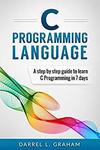Today's free ebook category is computer programming. Hopefully something that can help you. All ebooks were free at the time of posting.
Programming: HTML: Programming Guide: Computer Programming: LEARN IN A DAY! (PHP, Java, Web Design, Computer Programming, SQL, HTML, PHP) - US , AU
How To Make Your Own Video Game: Quick Start Guide (How To eBooks Book 41) - US,AU
C Programming: Language: A Step by Step Beginner's Guide to Learn C Programming in 7 Days - US, AU
Ruby For Beginners: Your Guide To Easily Learn Ruby Programming in 7 days - US, AU
jQuery For Beginners: Your Guide To Easily Learn jQuery Programming in 7 days - US, AU
Python 3 Programming: A Beginner Crash Course Guide to Learn Python 3 in 1 Week - US, AU
Java: Code Your Way to Corporate - A Beginners Guide to Learn the Latest Edition of Java Programming and Coding (java, java programming, java for dummies, … java tutorial, java book, java guide) - US, AU
JavaScript: Program a Dynamic, User-Responsive Website - A Crash Course to Learn JavaScript Programming and HTML the Easy Way (javascript, javascript the … programming, javascript for beginners) - US, AU
Bash Command Line Pro Tips - US, AU
Excel VBA: Tips and Tricks to Learn and Understand Excel VBA for Business Analysis - US, AU
PHP – HTML for a multilevel menu (IT Easy Solutions Programming & Office Automation Book 0) - US, AU
Python3 101 MCQ - Multiple Choice Questions Answers for Jobs, Tests and Quizzes: Python3 Programming QA (Python 3 Beginners Guide) - US, AU






isn't programmin in demand? did u go uni?